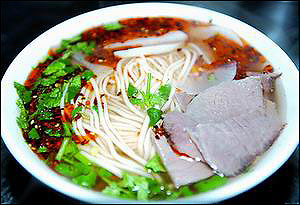To cap price of beef noodles: gov't responsibility?
By Du Wenjuan (chinadaily.com.cn)Updated: 2007-07-19 17:21 The Lanzhou government's regulation to set the price of beef noodles, a staple breakfast and lunch meal for the local residents stirred up a wave of criticism and discussion.
 Lanzhou beef noodles. [File Photo] |
In late June, the municipal government of Gansu Province's capital in northwest China announced the order that every restaurant could charge no more than 2.50 yuan ($32 cents) for a regular bowl of beef noodles. This was the administration's effort in trying to control the price of the meal, as the prices rose to 3 yuan from 2 yuan within six months this year.
Many questioned whether it is necessary for the government to set prices so
precisely as it is supposed to be regulated by the market.
Some residents
say the noodles are just a kind of local snack which is hard to be uniformly
graded or priced according to flavor and bowl size.
However, most
residents welcome the rule. "People whose monthly income ranges from 1,000 yuan
to 5,000 yuan eat beef noodles for breakfast," a local resident says.
According to a rough count, there are about 800 beef noodle restaurants scattered in Lanzhou - most of them privately owned --which account for about one-third of all eateries. They serve about 800,000 bowls of beef noodles every day as it is the specialty of the densely populated city.
Wang Zhixian, an official from the municipal price bureau said letting market
forces regulate the price of beef noodles does not mean the government cannot
set prices.
The bureau also said the decision was made after
local restaurants raised their price simultaneously which can be seen as market
irregularities and the unreasonable price hike upset residents.
The bureau said that even with the increase in the cost of raw materials such as flour, beef, oil and pepper being taken into account, the 20 percent rise in the price of each bowl "far exceeds the price rise of the raw materials".
A report from Workers' Daily also mentioned the beef noodles are not on the list of commodities that the government can set prices on. And if this dish was on it, they need to get a permit from higher authorities before they could make the decision.
Previously, the local quality control administration graded beef noodles according to the taste or quality for the restaurants to set different prices, but the restaurants ignored this grading process.
Official statistics shows Lanzhou people's disposable monthly income per capita in 2006 was 782 yuan ($100).
For local residents, the beef noodles are like rice, a necessity for everyday life. A rise of 50 fen for each bowl would be a significant financial impact on the people.
Because of this new rule, restaurants may short-change their customers, selling them inferior beef or noodles, or the bowl sizes may be smaller.
A Lanzhou resident says at the moment, the noodle restaurants' operations don't seem to be affected by the rule. "You still need to queue for a bowl and may eat as much as before."
"The rule has run far beyond the span of government's macro-control," said Liu Fuhuan, vice president of Academy of Macroeconomic Research of National Development and Reform Commission.
(1 dollar = 7.8125 yuan)
|
||
|
||
|
|